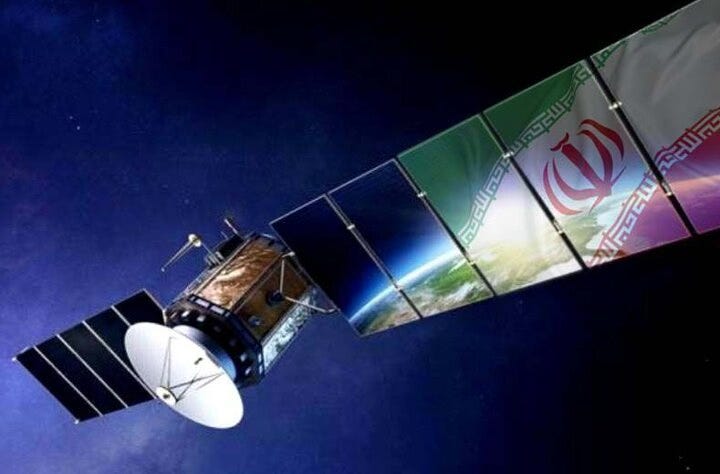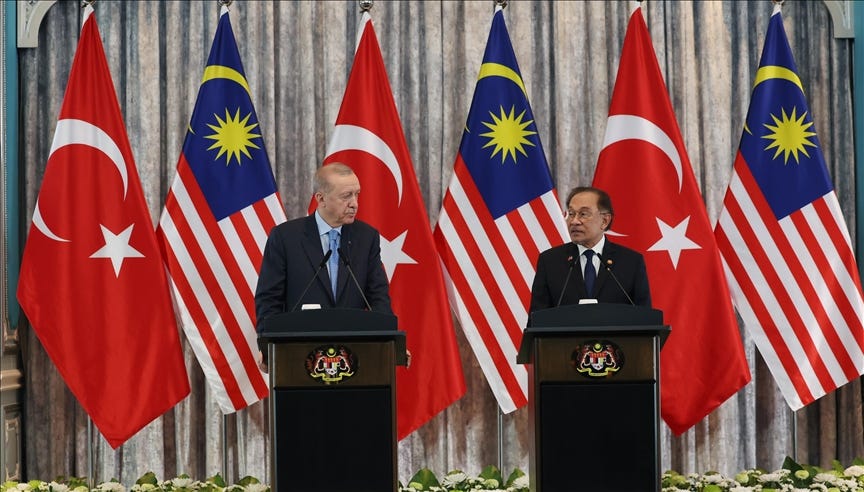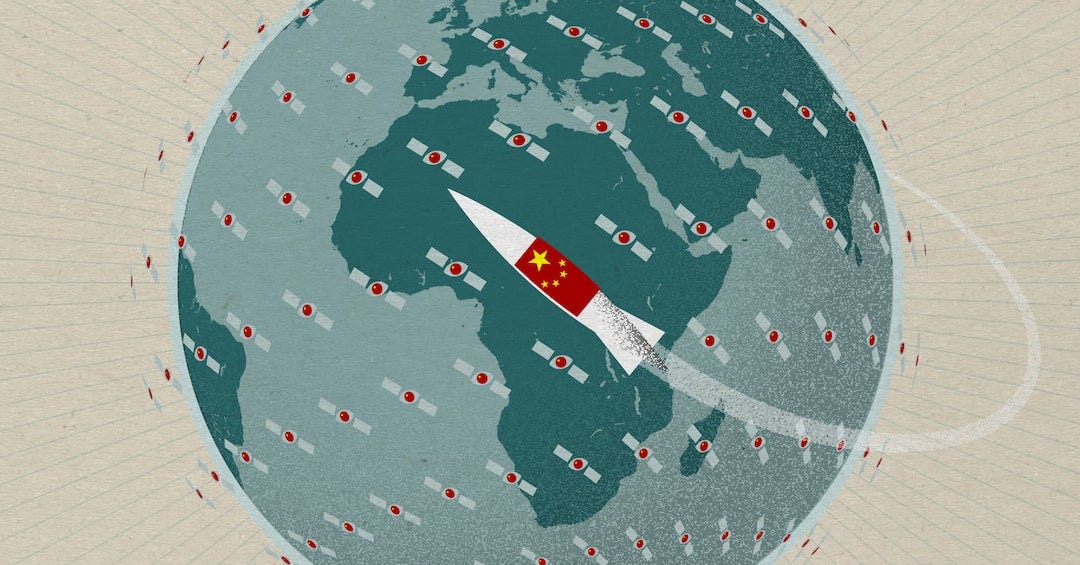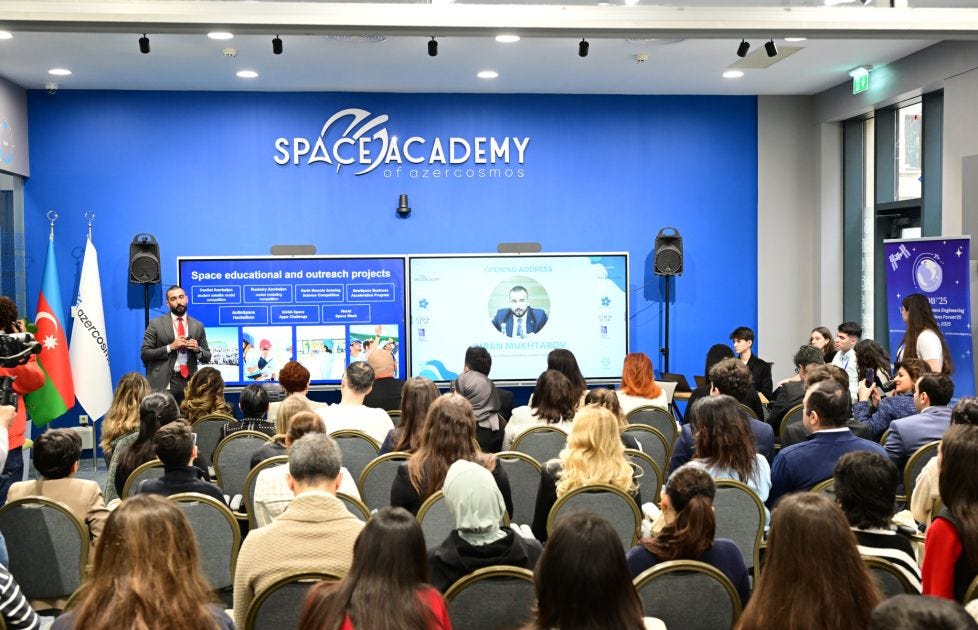Middle East Space Roundup: 10 to 16 February 2025
A summary of all the space news in the Greater Middle East over the past week, brought to you by AzurX
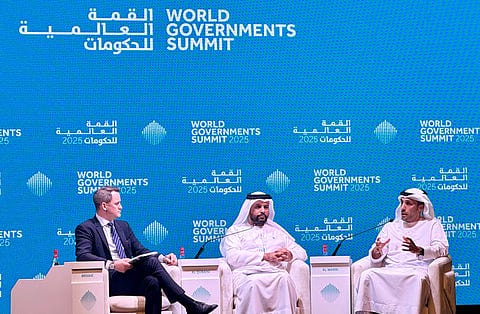
The following are the major space developments in the Greater Middle East region tracked by Middle East Space Monitor over the past week:
UAE Space Developments
UAE’s MBRSC Chief: Goal Is to Establish Humanity as a Multi-Planetary Species, Emirati on the Moon by 2035
The UAE’s space program is advancing with a clear vision toward establishing humanity as a multi-planetary species, as highlighted by Salem Al Marri, Director-General of the Mohammed bin Rashid Space Centre (MBRSC), at the World Government Summit (WGS) in Dubai. The UAE is strengthening its regional space cooperation, particularly with Saudi Arabia, aiming to expand joint astronaut missions, research collaborations, and outreach initiatives. Al Marri emphasized the UAE’s commitment to lunar and Martian exploration, aligning with global efforts to establish a sustainable human presence on the Moon as a stepping stone for future Mars missions. He reaffirmed MBRSC’s ambition to land an Emirati astronaut on the Moon within the next decade. The UAE’s space initiatives also address terrestrial challenges, such as water scarcity, by leveraging space exploration to enhance understanding of water resources. The UAE Astronaut Program, launched in 2017, has already marked significant milestones, including Sultan Al Neyadi’s long-duration ISS mission and the first Arab spacewalk. As the UAE expands its space capabilities, its collaboration with global partners continues to position the country as a key player in advancing human spaceflight and interplanetary exploration.
UAE Minister of Economy: Country Positioning to be a Space Manufacturing Hub
The UAE is positioning itself as a leader in advanced and complex manufacturing, with a strong emphasis on the space economy as a driver of economic growth and regional supply chain integration, according to Abdullah bin Touq Al Marri, Minister of Economy. Speaking at the World Governments Summit, Al Marri highlighted the need to move beyond traditional exports such as oil, gas, and metals, and instead focus on high-value, technologically advanced sectors that require specialized expertise and innovation. He emphasized that complex manufacturing, including space-related industries, will boost productivity and attract highly skilled talent, reinforcing the UAE’s role in science, technology, and life sciences. The UAE’s significant investments in Mars, lunar, and deep-space missions align with this strategy, aiming to create a sustainable space industry cluster that contributes to economic diversification. Additionally, Al Marri expressed confidence in the UAE’s economic outlook, projecting up to 6% GDP growth in 2025, supported by economic-friendly policies and the expansion of Comprehensive Economic Partnership Agreements (CEPAs), which the UAE aims to increase from 26 to 46. This strategic shift underscores the UAE’s ambition to become a global hub for space technology and advanced manufacturing, further strengthening its economic resilience and international competitiveness.
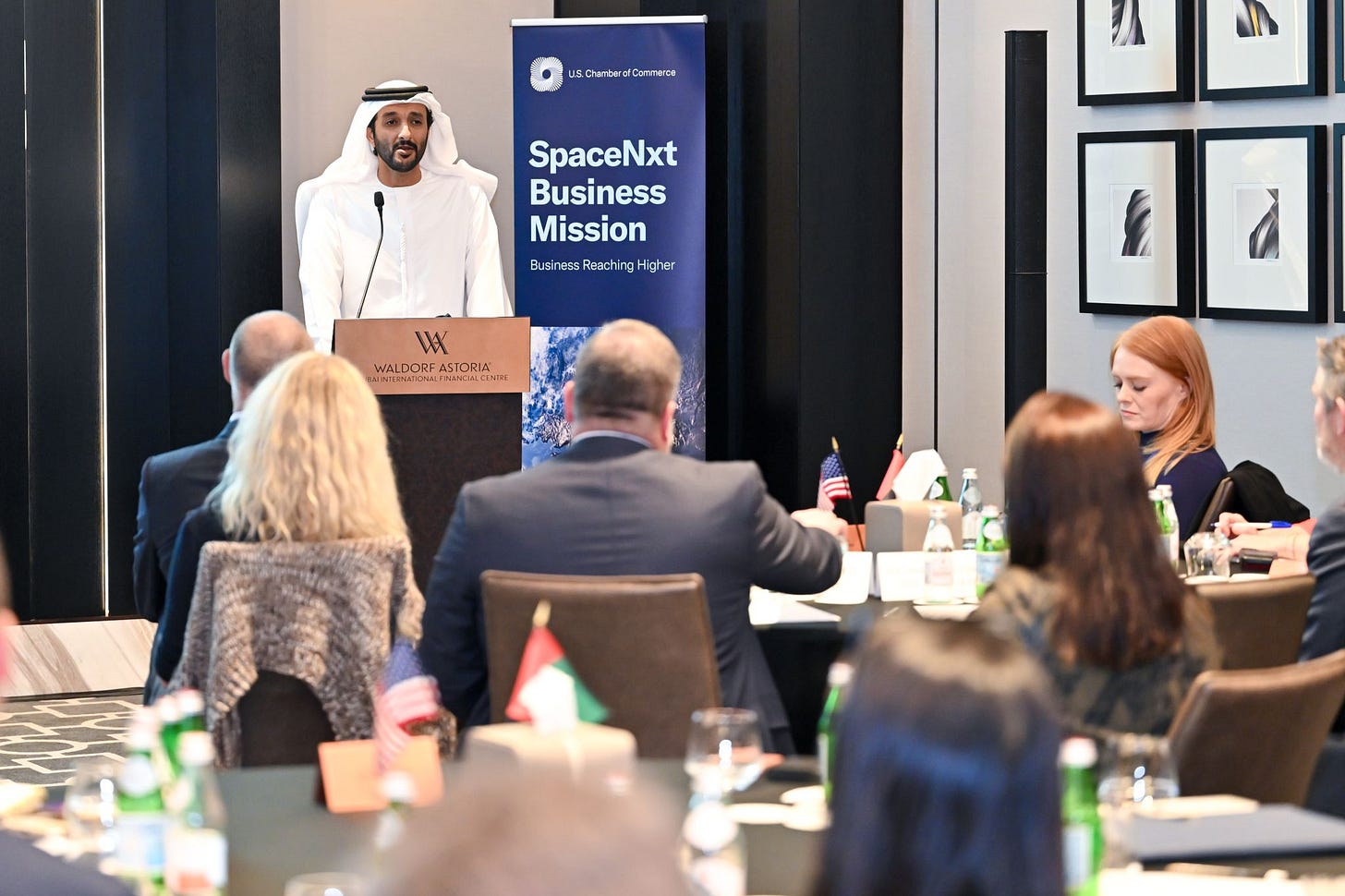
UAE’s MBRSC to Oversee the Integration and Testing of Gateway Airlock
The UAE’s Mohammed Bin Rashid Space Centre (MBRSC) has signed a memorandum of understanding (MoU) with Thales Alenia Space to collaborate on the Pressure Equalisation Unit (PEU - aka Airlock) for the Lunar Gateway space station, marking a major step in the UAE’s deepening involvement in cislunar infrastructure. Thales Alenia Space, a leader in pressurized habitat systems, will contribute core engineering and fabrication expertise, aligning the project with European space technology standards. MBRSC will oversee the integration and testing of the PEU, ensuring it supports the UAE’s broader lunar exploration objectives, including automation, robotic assistance, and thermal protection technologies. This partnership positions the UAE as a key player in sustainable lunar operations, building on its experience with the Emirates Lunar Mission and expanding its role beyond Earth observation and Martian exploration. The initiative also has significant dual-use applications, enhancing UAE’s research and development in life-support systems, material sciences, and autonomous navigation technologies. By contributing to the Lunar Gateway, the UAE gains strategic leverage in future Moon missions and strengthens its role in international space partnerships.
UAE Lunar Rovers to Use On-board Computers Provided by Australia’s AICRAFT
Australia’s AICRAFT has been selected to design and manufacture onboard computers (OBCs) for future lunar rovers under the Emirates Lunar Mission (ELM), enhancing the mission’s capabilities in navigation, communication, and autonomous operations. The collaboration with the UAE’s Mohammed Bin Rashid Space Centre (MBRSC) will integrate AI-driven, radiation-hardened computing solutions to withstand the extreme lunar environment. AICRAFT’s OBCs will support scientific data processing and ensure operational reliability despite intense temperature fluctuations and high-energy particle exposure. This partnership underscores MBRSC’s strategy of leveraging international expertise to advance space exploration and develop technologies that will contribute to future lunar and planetary missions.
UAE’s International Defence Conference Discusses Space Threats and Security
The UAE’s International Defence Conference 2025, under the theme “The Sky is no Longer the Limit: Emerging Threats and Opportunities in Space,” underscored the growing strategic importance of space in modern defense and warfare. As satellite launches surge and commercial satellites play an increasing role in active combat operations, experts highlighted the urgent need for enhanced space security measures. Dr. Mohamed Al Ahbabi of EDGE Group emphasized the role of artificial intelligence and quantum computing in strengthening satellite infrastructure while calling for international cooperation to manage space traffic and orbital debris. Clayton Swope of CSIS stressed the necessity of public-private partnerships and regulatory clarity to drive investment in propulsion and AI-driven space technologies. Capella Space CEO Frank Backes warned of rising threats in space, advocating for better data-sharing mechanisms to mitigate risks, while Hasan Al Hosani of Space42 reinforced the importance of declassifying data to enhance AI-driven decision-making and remote sensing integration. The session also addressed counter-space capabilities, missile defense, and secure satellite communications, concluding that nations must establish dedicated space forces and strategic alliances to navigate the evolving challenges of space security.
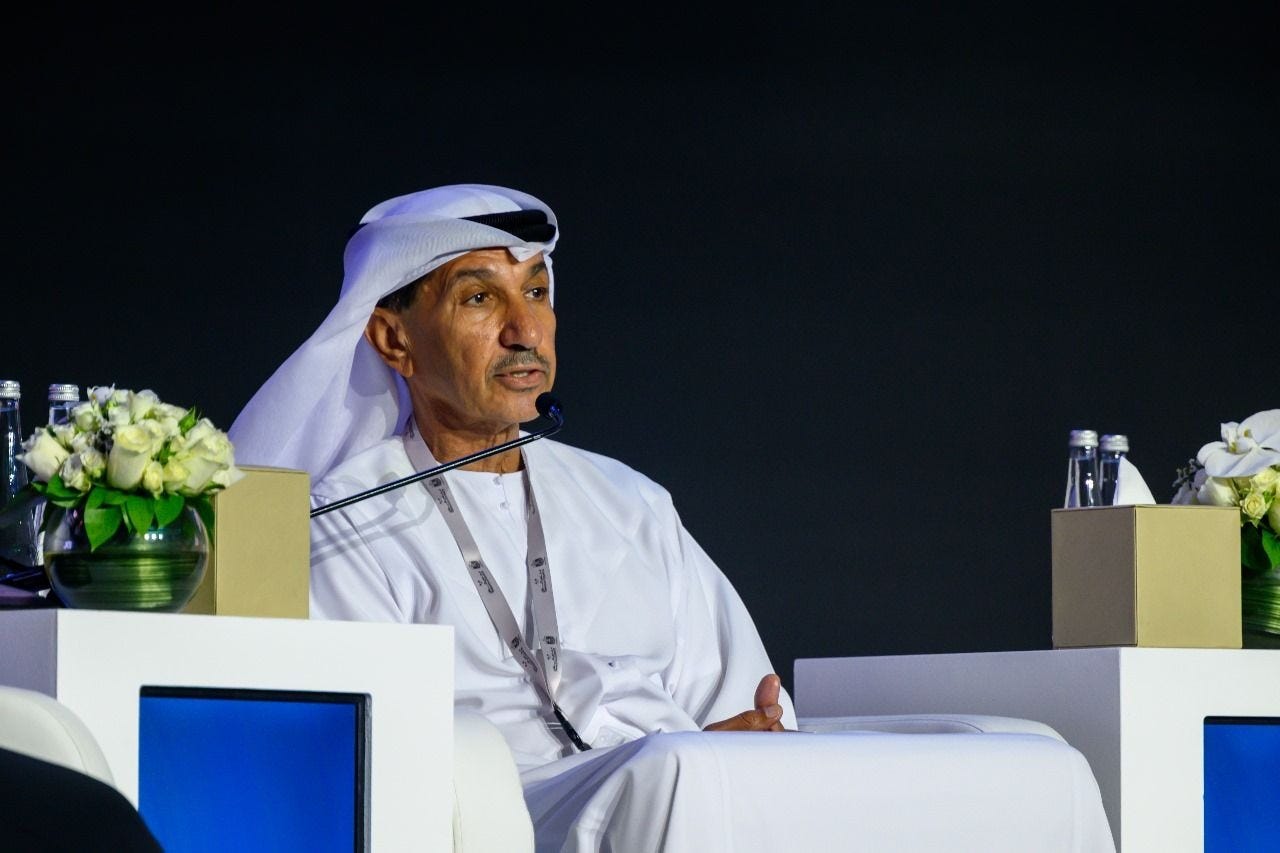
UAE’s Falcon Group Establishing Itself in Global Satellite Supply Chain
Falcon Group, a UAE-based precision engineering firm, is expanding its aerospace and industrial capabilities to strengthen the country’s position in global aerospace supply chains. As part of the UAE’s Make it in the Emirates initiative, Falcon Group played a pivotal role in the MBZ-SAT Earth observation satellite project, becoming the country’s sole supplier of aluminum precision-machined components. The company’s commitment to automation, AI-driven quality control, and sustainable manufacturing aligns with the UAE’s broader vision of fostering local expertise and reducing reliance on imports. With 90% of MBZ-SAT’s components sourced domestically, the UAE has taken a significant step toward becoming a hub for space manufacturing. Falcon Group’s transition from a general machining firm to a key aerospace supplier was driven by substantial investments in cutting-edge technology and workforce development, enabling it to meet stringent AS9100D aerospace and astronautical quality standards. The company’s ability to deliver high-precision satellite components underscores the UAE’s industrial transformation and the effectiveness of its strategy to localize advanced manufacturing in the space sector.
USA’s Reflect Orbital In the Spotlight At Dubai’s World Government Summit
Reflect Orbital, a U.S. space company pioneering space-based solar energy and light, has unveiled its innovative technology in Dubai at the World Government Summit, aiming to extend solar power availability beyond daylight hours. The company’s system utilizes orbital mirrors to capture and redirect sunlight, enabling urban illumination, sustainable energy supply, and potential applications in sun-deprived regions. Co-founder and CEO Ben Nowack emphasized that the initiative seeks to overcome the challenge of solar intermittency by efficiently delivering energy where and when it is needed. Previously discussed with Dubai’s Crown Prince Sheikh Hamdan bin Mohammed bin Rashid, the project aligns with the UAE’s renewable energy ambitions. The technology features lightweight satellite fleets capable of directing sunlight within an 800-kilometer radius in under 30 seconds, offering a novel approach to sustainable urban infrastructure and industrial energy demands.
Karim Michel Sabbagh of UAE’s Space42 Outlines Company’s Strategic Approach
UAE’s Space42 is positioning itself as a key player in the commercial space sector by leveraging hybrid connectivity, satellite imagery, and AI-driven geospatial analytics. In a recent Space News interview with correspondent Jason Rainbow, Space42’s Managing Director Karim Michel Sabbagh outlined the company’s strategic approach, which focuses on early adoption of emerging technologies, rapid scaling of innovations, and industry collaborations. A central component of Space42’s vision is its multi-orbit strategy, which supports advancements in direct-to-device (D2D) satellite connectivity to enhance mobile-satellite integration. Sabbagh highlighted the UAE’s Space Strategy 2030 as a driving force behind the company’s initiatives, emphasizing national talent development, technology transfer to other industries, and fostering international partnerships. As Space42 expands its capabilities, it aims to solidify its role in shaping the future of satellite communications and space-based analytics.
Lisa La Bonté: Shaping the Middle East’s Space Workforce
USA Today profiles Lisa La Bonté, who has played a transformative role in shaping the Middle East’s space workforce and knowledge economy through strategic, space-driven STEM initiatives. As the founder of the Arab Youth Venture Foundation (AYVF), she pioneered the region’s first comprehensive space education and workforce development programs, using aerospace and robotics as a gateway to prepare Gulf youth for careers in advanced industries. Her relentless efforts led to a landmark partnership with NASA, securing high-profile training opportunities for Arab students and placing the UAE on the global space map. Beyond space, La Bonté’s initiatives have fostered entrepreneurship, literacy, and youth empowerment, aligning with broader economic diversification goals across the Gulf Cooperation Council (GCC). Having raised over $225 million in capital and influenced over $8 billion in emerging markets, her legacy is evident in the growing number of young professionals entering the space sector—many of whom were first inspired by her programs. With the GCC set to participate in a historic Moon mission, La Bonté’s early efforts in talent development continue to shape the region’s future in space exploration.
Saudi Arabia Space News
Saudi Arabia’s Neo Space Group to Invest in LEO Constellations Through Partnerships or Independent Development
Neo Space Group (NSG) is advancing Saudi Arabia’s position in the global space industry through satellite communications, geospatial intelligence, and talent development, aligning with Vision 2030’s economic diversification goals. CEO Martijn Blanken confirmed NSG’s operationalization of the Saudi-owned SGS-1 satellite and its plans to expand the satellite fleet, including potential investments in low-Earth orbit (LEO) constellations through partnerships or independent development. The company is also strengthening its downstream satellite services, acquiring UP42 for geospatial data processing and securing an exclusive license from Saudi regulators for a national geospatial marketplace. Blanken emphasized Saudi Arabia’s need for sovereign space capabilities, ensuring national security and reducing reliance on foreign providers. Additionally, NSG is investing in research and workforce development through partnerships with the King Abdullah University of Science and Technology (KAUST) and King Fahd University of Petroleum and Minerals (KFUPM) to cultivate domestic expertise. While NSG’s primary mission is to build a Saudi-led space sector, it is also pursuing international opportunities in satellite services, in-flight connectivity, and satellite asset investments. With its broad strategic vision and government backing, NSG is positioned to be a key player in both regional and global space markets.
Saudi Arabia’s Neo Space Group Plans Earth Observation Satellite Acquisition
Neo Space Group (NSG) is positioning itself as Saudi Arabia’s leading space company by expanding its role in geospatial intelligence, satellite services, and AI-driven analytics. At LEAP 2025, NSG’s VP of Business Development, Hassan Al Johani, outlined the company’s strategic vision, which includes launching a geospatial data marketplace in 2025 and acquiring Earth observation satellites to provide high-resolution insights for government and business clients. With the recent acquisition of UP42, NSG aims to streamline geospatial data access, integrating value-added services and AI-powered analytics to enhance decision-making. The company is also expanding its presence in satellite communications (SATCOM) and positioning, navigation, and timing (PNT) technologies, reinforcing its competitive standing in the global space industry. By leveraging AI and machine learning for predictive analytics and real-time insights, NSG seeks to transform geospatial services, making them more accessible and impactful. With a broad and integrated approach across the space sector, NSG is committed to establishing Saudi Arabia as a major player in the global space economy.
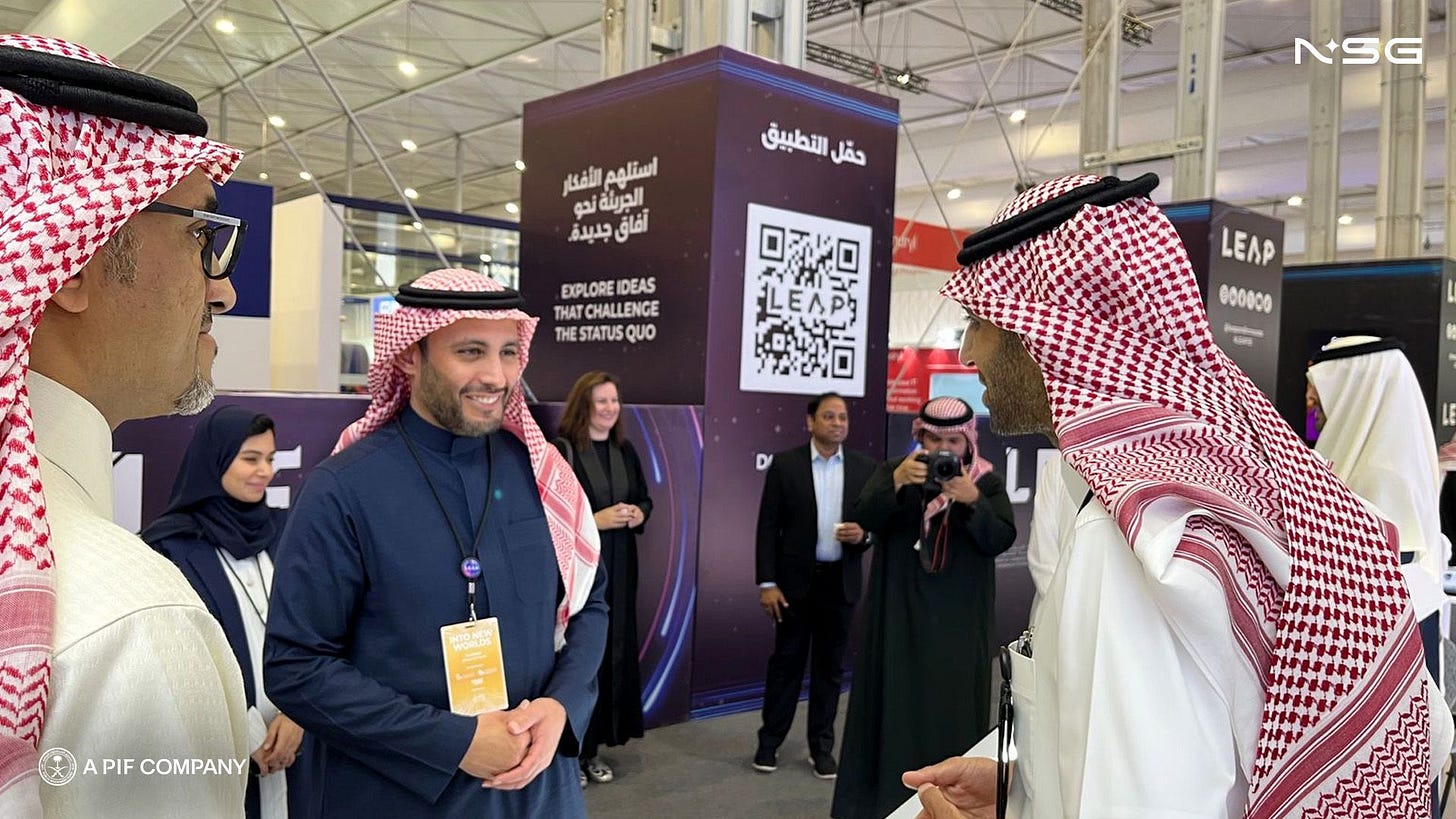
Saudi Arabia’s KFUPM Partners With Japan’s space for Lunar Exploration
Japan’s ispace, inc., a global lunar exploration company, has signed a memorandum of understanding with Saudi Arabia’s King Fahd University of Petroleum & Minerals (KFUPM) to explore collaborations in lunar exploration, spacecraft development, and capacity building. Announced during an ispace delegation visit to KFUPM’s Dhahran campus, the agreement sets the foundation for potential projects in lunar science, in-situ resource utilization (ISRU), and payload transportation to the Moon. ispace CEO Takeshi Hakamada emphasized the company’s commitment to supporting Saudi Arabia’s space ambitions through collaboration with KFUPM’s Interdisciplinary Research Centre for Aviation and Space Exploration. KFUPM’s Vice President for Research & Innovation, Dr. Ali Al Shaikhi, highlighted the partnership’s potential to drive aerospace innovation and position Saudi Arabia as a leader in space research. As part of this initiative, ispace will contribute expertise to KFUPM’s space technology programs, including nanosatellite development, space data analytics, and deep-space technology, with the university’s first nanosatellite mission set for launch in 2027.
Saudi Arabia’s ATSS Renews SATCOM Capacity Agreement With Eutelsat
Eutelsat has secured a renewed capacity agreement with Saudi Arabia’s Advanced Telecommunications Solutions and Services (ATSS) on the EUTELSAT-8 West B satellite, reinforcing a long-standing partnership in the Middle East. Announced during the LEAP 2025 event in Riyadh, the deal allows ATSS to continue leveraging Eutelsat’s Ku-band coverage to provide premium broadcast services across the MENA region. ATSS CEO Abdullah Al Osaimi emphasized that the collaboration strengthens the company’s satellite service portfolio, ensuring secure and resilient connectivity for various industries while driving digital transformation and smart connectivity across Saudi Arabia. This agreement highlights Eutelsat’s sustained role in the region’s satellite communications infrastructure.
Saudi Arabia’s LEAP 2025 Announces $1.78 Billion in Space and Digital Investments
Saudi Arabia's LEAP 2025 Tech Conference marked a significant milestone in advancing its digital and space economy, with $1.78 billion in investments announced across AI, digital infrastructure, and emerging technologies. The Communications, Space, and Technology Commission (CST) launched Cohort 3 of its regulatory sandbox program, fostering innovation while maintaining regulatory oversight. CST Governor Mohammed Al-Tamimi emphasized the growing intersection of space and the digital economy, with over 20 events dedicated to space competition and its role in technological advancement. The conference also saw major investments in AI and cloud computing, including Equinix's $1 billion data center expansion and DAMAC’s EDGNEX plan to develop a 500-megawatt cloud and AI infrastructure by 2030. Startups and venture capital received nearly $700 million in commitments, supporting AI-driven solutions, logistics, and gaming. Additionally, Microsoft and Huawei announced AI training academies to build Saudi Arabia’s digital workforce. As Saudi Arabia accelerates its Vision 2030 strategy, LEAP 2025 reinforces the Kingdom’s ambition to position itself as a leader in space-enabled digital transformation and AI-driven innovation.
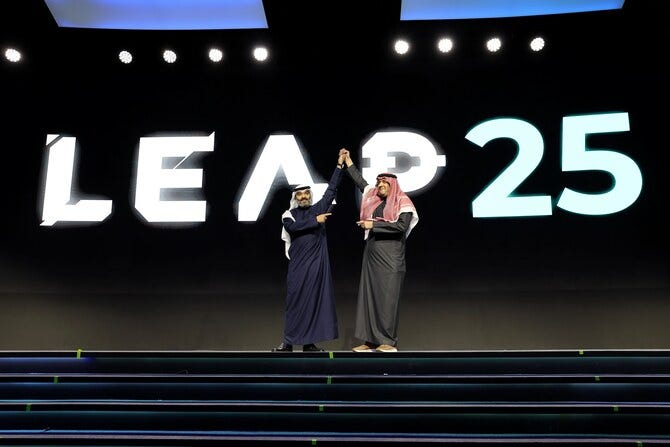
Saudi Space Agency Concludes Participation in LEAP 2025 Conference
The Saudi Space Agency (SSA) concluded its participation in the LEAP 2025 conference in Riyadh, Saudi Arabia, showcasing its initiatives to drive innovation in the space sector through advanced technologies, international collaboration, and workforce development. SSA organized key discussions on deep space exploration, leveraging space applications for sustainability, and fostering Saudi talent through academic programs and training. The sessions featured Saudi astronauts and global experts, addressing technical challenges and strengthening research cooperation. A notable focus was empowering women in technology and expanding Saudi Arabia’s role in global space partnerships. SSA’s engagement at LEAP25 aligns with the Kingdom’s broader strategy to position itself as a leader in space sciences, reinforcing its commitment to sustainable development and advanced space technologies.
Iran Space Developments
Iran Plans to Launch Navak Communications Satellite
Iran is advancing its space ambitions with the planned launch of the Navak telecommunications satellite, marking a critical step toward achieving geosynchronous orbit (GEO). Developed by the Iranian Space Research Center, Navak weighs 40 kg and is designed to test the capabilities of the optimized Simorgh satellite launch vehicle (SLV), which will place it into an elliptical orbit. The satellite features key instrumentation, including a dosimeter for space radiation measurement, a magnetometer for detecting Earth’s magnetic field, and torque actuators for attitude control, highlighting Iran’s growing technical expertise in satellite engineering. This mission represents a significant milestone in Iran’s space industry, enhancing its domestic communications infrastructure while refining its launch vehicle technology for future, more ambitious satellite deployments.
Iran to Open Space Domain Awareness Center, Inaugural Satellite Satellite Launch from Chabahar in March 2025
Iran is advancing its space infrastructure with the planned inauguration of a new strategic space center in Khorassan Razavi province by May 2025, according to Iranian Space Agency head Hassan Salarieh. The facility will feature an advanced Space Object Observatory developed in collaboration with the Asia-Pacific Space Cooperation Organization (APSCO) to enhance satellite and space object monitoring. Concurrently, Iran is constructing the Chabahar Space Center, which, according to ICT Minister Issa Zare’pour, will be the largest space facility in West Asia. The first phase of the Chabahar center is over 56% complete and is expected to become operational by early February 2025, with a planned satellite launch from the site before the Persian year ends on 20 March 2025. These developments highlight Iran’s expanding ambitions in space technology and regional leadership in launch capabilities.
Iran Unveils Indigenously-Built GNSS Terminal
Iran has unveiled the Sohair-1 tracking system, a high-precision satellite-based locator developed by the Iranian Armed Forces Geographical Organization, enhancing Iran’s capabilities in geospatial intelligence and navigation. The system integrates with Iran’s network of nearly 170 permanent Global Navigation Satellite System (GNSS) stations, enabling centimeter-level tracking accuracy—far exceeding conventional GPS-based trackers limited to meter-level precision. This advancement has significant military and civilian applications, including transportation and logistics. Developed in collaboration with Iranian knowledge-based companies, the industrial version of Sohair-1 follows a successful prototype phase and has already been pilot-installed on 150 vehicles. The unveiling of this system underscores Iran’s strategic investment in indigenous satellite positioning technologies to bolster national security and reduce reliance on foreign navigation systems.
Iran Showcases Omid SLV 46th Anniversary Celebration of the Islamic Revolution
Iran showcased its latest military advancements, including ballistic missiles and a domestically developed satellite launch vehicle (SLV), during a large-scale rally in Tehran marking the 46th anniversary of the Islamic Revolution. Among the displayed systems were the Khorramshahr missile, capable of delivering multiple warheads over a 2,000 km range, and the Hajj Qassem missile, a new-generation Fateh-110 variant designed to penetrate air defense systems with a 1,400 km range. The Omid SLV was also presented, signaling Iran’s continued progress in indigenous space launch capabilities. The event served as a platform for Iran to demonstrate its growing missile and space technology capabilities amid heightened geopolitical tensions.
Iran Commits to Advancing Space Technology, Strengthen Position in Global Space Sector
Iran has successfully launched at least ten domestically produced satellites into Earth orbit in recent years, underscoring its commitment to advancing space technology and strengthening its position in the global space sector. Iranian Ambassador to Turkmenistan Ali Mojtaba Rouzbehani highlighted this achievement as a testament to the country’s scientific progress and aspirations for international cooperation in space. Iran, which initiated its space program in 2004, remains one of the 24 founding members of the United Nations Committee on the Peaceful Uses of Outer Space. While developing its independent launch capabilities, Iran has also conducted satellite launches from Russian facilities. Beyond space, the country boasts a robust high-tech sector with approximately 10,000 technology companies and is a global leader in medical isotope production for cancer and neurology treatments. These advancements reflect Iran’s broader ambitions to integrate space technology into its scientific and industrial landscape while navigating geopolitical challenges and expanding its influence in the space domain.
Türkiye Space News
Türkiye to Build Replacement Communications Satellite for Turksat-3A
Türkiye is advancing its satellite capabilities with preparations for a domestically produced replacement for Turksat-3A, which is nearing the end of its operational lifespan, Minister of Transport and Infrastructure Abdulkadir Uraloglu announced. The move underscores Türkiye’s commitment to strengthening its national satellite fleet, which currently includes six communications satellites (Turksat-3A, 4A, 4B, 5A, 5B, and the soon-to-be-operational 6A), along with the Gokturk surveillance satellite. Turksat-6A, Türkiye’s first fully locally designed and manufactured communications satellite, is in its final testing phase and will soon enter service, marking a major milestone in domestic aerospace development. Uraloglu emphasized that Türkiye’s investments in space technologies are key to shaping its future leadership in the sector, particularly following the successful launch of three communications satellites since 2021. With growing private sector engagement in low-Earth orbit satellite projects and increasing momentum in space-related R&D, Türkiye is positioning itself as a significant player in the global satellite industry.
Türkiye and Malaysia to Cooperate on Joint Remote Sensing Micro Satellite Development Program
Turkish President Recep Tayyip Erdogan's visit to Malaysia reinforced strategic cooperation in satellite and space technology, highlighting both countries' commitment to advancing their capabilities in the sector. A key outcome of the visit was the reaffirmation of the Malaysia-Türkiye Joint Remote Sensing Micro Satellite Development Program, which aims to enhance both countries' space infrastructure and foster technology exchange. This collaboration aligns with broader bilateral efforts in trade, defense, energy, and multilateral engagement, further solidifying their Comprehensive Strategic Partnership. Türkiye and Malaysia also emphasized the importance of technology transfer and joint research initiatives, underscoring the role of space-based applications in national development. As both countries deepen their commitment to satellite and space cooperation, this partnership is expected to drive innovation and position them as key players in the evolving global space economy.
Türkiye and Pakistan to Collaborate on Satellite Communications
Pakistan and Türkiye have reaffirmed their commitment to deepening collaboration in information technology, 5G, and artificial intelligence (AI), with a focus on digital transformation and e-governance. During a meeting between Pakistan’s Minister of State for IT and Telecom, Shaza Fatima Khawaja, and Türkiye’s Ambassador to Pakistan, Irfan Neziroglu, both sides emphasized the strategic importance of leveraging digital technologies to drive economic growth and efficiency. Türkiye’s e-governance model, benefiting 67 million users with 8,000 digital services, was highlighted as a framework for Pakistan’s digital transformation efforts. The discussion also explored potential business-to-business (B2B) partnerships, particularly between Pakistan’s National IT Board (NITB) and Türkiye’s Türksat, to enhance digital infrastructure. Khawaja reiterated Pakistan’s commitment to fostering international IT cooperation, stressing the growing importance of digital skills over traditional degrees. The implementation of the Digital Nation Pakistan Bill was noted as a key step toward improving e-governance, data exchange, and economic stability. Both countries agreed on the necessity of strengthening digital growth initiatives to create employment opportunities and drive technological innovation.
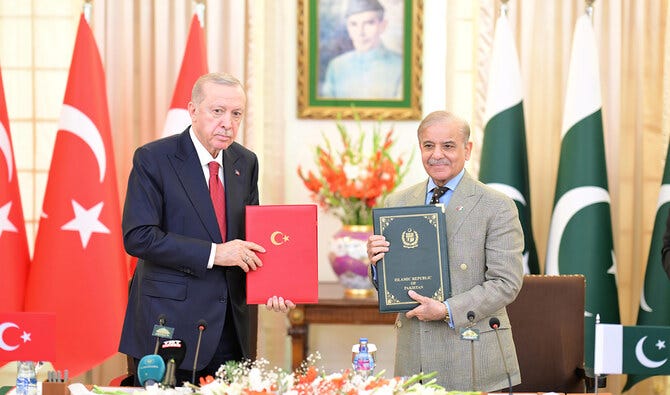
Opinion: Türkiye and Pakistan to Strengthen Space Cooperation
In Eurasia Review, Dr. Sahibzada Muhammad Usman writes Türkiye and Pakistan are strengthening their strategic alliance beyond trade and defense, with increasing cooperation in satellite technology and space exploration. The Turkish Scientific and Technological Research Council (TÜBİTAK) and Pakistan’s Space and Upper Atmosphere Research Commission (SUPARCO) are positioned to collaborate on satellite development to enhance regional communication and surveillance capabilities. This potential partnership could align with broader defense cooperation, which already includes joint ventures in drone technology and naval assets. Additionally, both countries recognize the importance of geospatial intelligence, with satellite-enabled solutions playing a role in infrastructure, logistics, and cybersecurity. As Türkiye advances its aerospace capabilities and Pakistan seeks to expand its digital economy, their combined efforts in satellite development and space technology could facilitate a deeper integration into global space supply chains. Looking ahead, their collaboration could not only boost national security but also drive innovation in commercial satellite applications, making space a key pillar of their evolving economic and technological partnership.
Algeria and Egypt Space Developments
Egypt’s Growing Role as a Space Hub in China’s Global Space Strategy
On the outskirts of Cairo, Egypt’s Space City is emerging as a key hub in China’s expanding global space strategy, positioning the country as a central partner in Beijing’s growing influence over Africa’s space sector. While officially celebrated as Africa’s first satellite production facility, the lab heavily relies on Chinese technology, personnel, and logistical support, with components shipped from Beijing and Chinese engineers overseeing operations. Egypt’s collaboration with China has resulted in the launch of three satellites, including MisrSat-2, which was assembled in Cairo but primarily built in China. This strategic alliance extends beyond satellite manufacturing, encompassing a newly established space monitoring center featuring advanced telescopes and Earth observation systems. Egypt is also among the African countries partnering with China on its future International Lunar Research Station (ILRS), further integrating its space program into Beijing’s broader geopolitical ambitions. Despite its longstanding ties with the United States, Egypt’s deepening space collaboration with China highlights a broader shift in Africa’s space landscape, where Beijing’s investments and technology transfers are fostering long-term dependencies. While officially framed as a neutral partnership aimed at technological advancement, concerns persist over potential military applications, data-sharing agreements, and China’s long-term presence in Egyptian space infrastructure. As global competition in space intensifies, Cairo’s strategic positioning within China’s space network reflects the growing role of emerging space nations in shaping the future of international space cooperation and security dynamics.
Algeria and Slovenia Advance Space Cooperation Talks
The Algerian Space Agency (ASAL) and the Slovenian Space Office have initiated a strategic collaboration to advance space technologies and applications, following directives from Algerian President Abdelmadjid Tebboune after his meeting with Slovenian Prime Minister Robert Golob in 2024. During the meeting in Algiers, ASAL Director General Azzedine Oussedik and Slovenian Space Office Director Tanja Permozer outlined joint efforts to leverage artificial intelligence for monitoring natural resources, groundwater, strategic agriculture, and mining, as well as for disaster prevention and management. With Slovenia recently becoming a full member of the European Space Agency, the partnership aims to enhance Algeria’s space capabilities through knowledge exchange and joint projects in optics, telecommunications, and satellite systems. The visit also includes thematic workshops where specialists from both countries will explore opportunities for further collaboration in the evolving space sector.
Analyst: Algeria, Egypt, Other African Countries, Reluctant to License Starlink
Temidayo Oniosun writes for the Atlantic Council that Algeria and Egypt, among other African countries, are emerging as key players in the evolving dynamics of Africa’s space sector, particularly as they navigate their approach to foreign satellite operators like Starlink. While Starlink has rapidly expanded across the continent, regulatory hesitations in Algeria and Egypt reflect broader concerns about protecting national satellite infrastructure and ensuring that local industries remain competitive. Both countries, with strong domestic satellite capabilities, have yet to license Starlink, in part due to its disruptive market entry, which bypasses traditional telecom investment requirements. This hesitation is further compounded by competition from Eutelsat’s OneWeb, which offers more favorable licensing terms to African governments. As the United States considers strengthening its space partnerships in Africa under the Trump administration, it faces the challenge of balancing diplomatic engagement with commercial interests. Addressing licensing disputes, supporting sustainable space practices, and aligning with Africa’s growing space ambitions—particularly in Egypt and Algeria, which are expanding their national space programs—will be crucial. Beyond commercial concerns, U.S. policymakers must also differentiate their approach from geopolitical rivals such as China and Russia, whose investments in Africa’s space sector have deepened in recent years. Encouraging joint technology development, space capacity-building, and structured partnerships will help position the United States as a strategic and transparent partner in Africa’s space future.
Israel Space News
Israel’s Spacecom Secures $3.8 Million SATCOM Contract From African Country
Israel’s Spacecom has secured a $3.8 million agreement with an African government to provide satellite communication services via its AMOS-17 high-throughput satellite (HTS) for 12 months, marking a strategic expansion of its presence in the continent. Since its launch in 2019, AMOS-17 has played a pivotal role in enhancing Africa’s digital infrastructure, supporting government initiatives such as Kenya’s transition to digital terrestrial TV, Nigeria’s e-learning programs, and partnerships with telecommunications providers across Angola and Senegal. This latest deal underscores Spacecom’s growing influence in Africa’s connectivity landscape, reinforcing its reputation as a trusted satellite services provider. As the company continues to leverage AMOS-17’s multi-band capabilities to bridge digital gaps and improve communication networks, the agreement is expected to drive revenue growth and further cement Spacecom’s role in delivering critical government and commercial communication solutions across Africa.
Israel’s Gilat Satellite Networks Reports Strong Financial Results for 2024
Israel’s Gilat Satellite Networks reported strong financial results for 2024, with annual revenue reaching $305.4 million, a 15% increase from the previous year, and adjusted EBITDA rising to $42.2 million. The company’s defense and in-flight connectivity (IFC) segments saw significant growth, supported by increased orders from the U.S. Department of Defense and rising demand for satellite-based broadband. The acquisition of Stellar Blu has positioned Gilat as a key player in the electronically steerable antenna (ESA) market, enhancing its IFC offerings across geostationary (GEO), low-Earth orbit (LEO), and multi-orbit satellite constellations. Looking ahead to 2025, Gilat projects revenues between $415 and $455 million, with adjusted EBITDA expected to reach up to $53 million. To capitalize on defense market expansion, the company plans increased investments in R&D and sales, particularly following its strategic acquisition of DataPath Inc. Reflecting its evolving business strategy, Gilat has reorganized into three divisions: Gilat Defense, focusing on secure satellite communications for military applications; Gilat Commercial, specializing in broadband satellite networks for IFC, enterprise, and cellular backhaul; and Gilat Peru, managing large-scale telecom infrastructure projects in Latin America. Recent key contracts include an $18 million order for IFC solutions, $9 million for multi-orbit platforms, and multiple defense-related deals, reinforcing Gilat’s role as a leading provider of satellite communication technology across commercial, government, and military markets.
Other Regional Space Developments
Bahrain’s NSSA Sign MoU With Hong Kong’s Uspace for Satellite Manufacturing
Bahrain’s National Space Science Agency (NSSA) has signed a memorandum of understanding with Hong Kong-listed Uspace Technology Group to collaborate on satellite manufacturing, telemetry, tracking, and data applications. Uspace plans to manufacture 100 satellites in early 2025, positioning Bahrain to strengthen its role in the regional satellite industry. This agreement aligns with NSSA’s broader strategy, including planned partnerships with the UAE’s Mohammed bin Rashid Space Centre (MBRSC) for lunar exploration and sustainability initiatives. The growing investment in Bahrain’s space sector reflects a broader regional trend, with a Euroconsult (now Novaspace) report projecting that the Middle East’s space economy will reach $75 billion by 2032, marking a 92% increase in spending over the next decade. The region’s space sector has already tripled in value over the past ten years, reaching $25 billion by 2023. These developments underscore Bahrain’s ambitions to enhance its position in the global space industry and leverage satellite technology for economic and scientific advancements.
Azerbaijan’s Azercosmos Hosts International Aerospace and Digital Innovations Forum
The inaugural International Aerospace and Digital Innovations Forum (IAEDIF’25), held at the Space Academy of Azercosmos, marked a significant step in fostering youth engagement in aerospace, digital innovation, and sustainability. Organized by the Youth Aviators Society with support from Azercosmos, the British Embassy, and other key partners, the forum provided a platform for high school and university students to engage with industry experts on global challenges in STEM, AI, cybersecurity, and space exploration. The event featured five panel discussions on topics such as sustainable digital development, aeronautics, and AI-driven cybersecurity, with participation from leading organizations including the UN, Innovation and Digital Development Agency (IDDA), Azercosmos, and Türkiye Teknoloji Vakfı. A highlight was the keynote address by Prof. Huseyn Mirzayev of Garabagh University, marking the institution’s first representation at an international youth-led forum. With plans for IAEDIF to become an annual event, organizers aim to expand global participation and align with major industry gatherings such as the International Astronautical Congress (IAC) and COP30, strengthening Azerbaijan’s role in the global aerospace and digital innovation landscape.
Be sure to catch up with space activities in the region in the next edition of Middle East Space Monitor’s space roundup!




